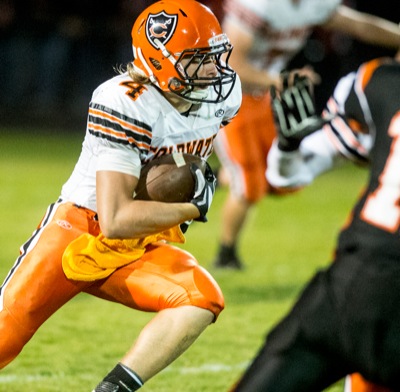Thursday, September 18th, 2014
St. Marys man says proper attitude key to being right on target
By William Kincaid
ST. MARYS - Robert Vogel had just 20 seconds to achieve what he trained for his entire adult life - winning the International Practical Shooting Confederation Championship in Rhodes, Greece, in 2011.
His hands shaking with nervousness, the 2000 St. Marys Memorial High School graduate repeated to himself something he had professed hundreds of times before: "I know I can still do it."
Vogel, now 32, beat 386 other practical shooting competitors from 52 countries to claim the cup.
Speaking to the St. Marys Rotary Club on Wednesday afternoon, he stressed the importance of mental fortitude and positive thinking.
All of the world's greatest performers, athletes and professionals have a strong internal self-image, he said. Whether shooting a gun, playing a piano, carrying out a hobby or doing well at work, the most accomplished people believe they are the best, Vogel added.
"You will almost always perform to that self-image but you don't perform above it or below it, you usually perform to it," he said. "The challenge is how do you raise your self-image, how do you get yourself in your mind and your heart and your soul to truly believe that you are that much better?"
The answer, he said, is directive affirmation, a technique that has helped the two-time member of the USA Mens IPSC Gold Team and first law-enforcement officer to win a U.S. Practical Shooting Association Handgun National Championship and win 70 state, national and world championship matches.
By writing down specific goals to become a national champ - and reading them hundreds of times - one's mind eventually begins to believe it, he said.
"It's not magic but psychologically what you're trying to do, you're trying to trick your brain into believing that it is really supposed to happen, almost more so that it already happened, and there is definitely something to that," Vogel said.
He also spoke of the importance of stepping out of comfort zones. People who do this tend to achieve more in life, he said.
"Your comfort zone gets bigger. Now all of a sudden you're comfortable with doing stuff that most people aren't and you've got an edge on them," he said.
Vogel's love affair with shooting began early in life. At 9, his parents entrusted him to hunt with a shotgun in the woods by himself. After graduating from the police academy at Rhodes State College, Lima, he joined the Spencerville Police Department. A year later, he joined the Kenton Police Department where he served as a police officer and SWAT team member for eight and a half years.
During that time, he was shooting competitively, spending as much as $7,000 a year on ammunition and travel expenses. He entered his first competition in Findlay at age 19 and took first place.
"To this day, I think I was as thrilled about that as I was at winning nationals and worlds and everything else I've been able to do since then," he said. "I think just this little light bulb went off in my head. It's like, you know you're young, you've got some talent here, if you really truly devote yourself to this, maybe you can be one of the best that there is at this. So from that point on - good, bad or indifferent - I really did devote my life to that."
Vogel started breaking even financially at competitions before eventually making a profit, gaining recognition and sponsorships. He also received offers to teach classes.
Vogel decided to leave the police force and focus exclusively on professional shooting and teaching, spending 150 days per year traveling to most of the states and places such as Russia, Finland, Norway, Costa Rica, Ecuador, Indonesia, South Africa and Greece.
"But the more places I go, the more happy I am that I live here, seriously, back here in the United States and even in St. Marys," he said. "(There) are too many people pretty much everywhere else. Other countries, too, they just simply do not have the freedoms that we have, especially in relation to what I do."
His knowledge of the sport landed him a spot as an expert on the fourth season of History Channel's reality show, "Top Shot."
What Vogel does best is compete in practical shooting events, which he said balances speed and accuracy through combat-like courses.
"The targets we shoot at are not that hard to hit," he said. "What separates the levels of guys is how fast can you do it."
Vogel normally uses one of his 20 Glock handguns.
"What you see on most police officers' hips, that's not that far off from what I shoot," he said. "I do little modifications to them but not a whole lot different than that."
Vogel also spoke of the importance of being aware of one's surroundings. Criminals, like lions, prey on the weak and submissive, as well as those not paying attention, he said.
His cardinal rule of safety is not to allow anyone to come within 6 to 8 feet of him without knowing his or her presence. His police officer training prompts him to make eye contact with everyone he sees.
He supports concealed carry laws, pointing out that individuals are ultimately responsible for their own safety. Many times police are minutes away when the difference between life and death is just a few seconds.
"Most law-abiding citizens, adults, do not truly understand violence. They don't understand how aggressive, how quick it happens," he said.
Nine out of 10 times when a gun stops a violent crime, it's because it was simply brandished, not fired, he said. But it can mean the difference between life and death, he added.
"Needing a gun is kind of like needing a parachute. You know, if you need one and you don't have one, you'll probably never ever need one again," he said.
Vogel also spoke about officer-involved shootings, noting that many people often question why an officer uses deadly force or why an officer doesn't shoot someone in the leg.
"These people have no idea what that was really like, how fast that actually happens," he said. "If an officer shot somebody six times, people envision it as 'bang, bang, I don't like you, bang, I'm going to shoot you some more.' That's not how that happens."
It's easy to fire six shots under a second, he said.
"At that very instance, you are shooting because you think that person is trying to kill you right now, or somebody else right now, and you are shooting to stop that person," Vogel said. "And it happens so so fast."

